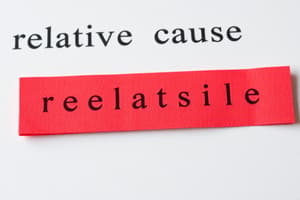Podcast
Questions and Answers
A relative clause is a type of dependent clause that provides additional information about a ______ in the main clause.
A relative clause is a type of dependent clause that provides additional information about a ______ in the main clause.
noun
Relative clauses function as ______, modifying the noun they refer to.
Relative clauses function as ______, modifying the noun they refer to.
adjectives
The relative pronoun ______ refers to people.
The relative pronoun ______ refers to people.
who
In some cases, the relative pronoun can be omitted if it is not the subject of the ______ clause.
In some cases, the relative pronoun can be omitted if it is not the subject of the ______ clause.
Relative clauses can sometimes be reduced to ______ or single words.
Relative clauses can sometimes be reduced to ______ or single words.
Flashcards are hidden until you start studying
Study Notes
Definition and Function
- A relative clause is a type of dependent clause that provides additional information about a noun in the main clause.
- It begins with a relative pronoun (e.g. who, which, that, whom, whose) and contains a subject and a predicate.
- Relative clauses function as adjectives, modifying the noun they refer to.
Types of Relative Clauses
- Restrictive relative clauses: provide essential information about the noun and are essential to the sentence's meaning.
- Example: The book that is on the table is mine.
- Non-restrictive relative clauses: provide additional, non-essential information about the noun and are set off with commas.
- Example: The book, which is on the table, is mine.
Relative Pronouns
- Who: refers to people
- Example: The student who is sitting in the front row is my friend.
- Which: refers to animals, objects, and ideas
- Example: The book, which is on the table, is mine.
- That: can refer to people, animals, objects, and ideas
- Example: The book that is on the table is mine.
- Whom: refers to the object of a verb or preposition (people)
- Example: The student whom I met yesterday is very friendly.
- Whose: shows possession (people, animals, objects)
- Example: The student whose book is on the table is my friend.
Omitting the Relative Pronoun
- In some cases, the relative pronoun can be omitted if it is not the subject of the relative clause.
- Example: The book I read yesterday is mine.
- However, it is often necessary to include the relative pronoun to ensure clarity and avoid ambiguity.
Reducing Relative Clauses
- Relative clauses can sometimes be reduced to phrases or single words.
- Example: The book on the table is mine. (reduced from "The book that is on the table is mine.")
Definition and Function
- A relative clause is a type of dependent clause that provides additional information about a noun in the main clause.
- It begins with a relative pronoun (e.g. who, which, that, whom, whose) and contains a subject and a predicate.
- Relative clauses function as adjectives, modifying the noun they refer to.
Types of Relative Clauses
- Restrictive relative clauses provide essential information about the noun and are essential to the sentence's meaning, e.g. "The book that is on the table is mine."
- Non-restrictive relative clauses provide additional, non-essential information about the noun and are set off with commas, e.g. "The book, which is on the table, is mine."
Relative Pronouns
- Who refers to people, e.g. "The student who is sitting in the front row is my friend."
- Which refers to animals, objects, and ideas, e.g. "The book, which is on the table, is mine."
- That can refer to people, animals, objects, and ideas, e.g. "The book that is on the table is mine."
- Whom refers to the object of a verb or preposition (people), e.g. "The student whom I met yesterday is very friendly."
- Whose shows possession (people, animals, objects), e.g. "The student whose book is on the table is my friend."
Omitting the Relative Pronoun
- In some cases, the relative pronoun can be omitted if it is not the subject of the relative clause, e.g. "The book I read yesterday is mine."
- However, it is often necessary to include the relative pronoun to ensure clarity and avoid ambiguity.
Reducing Relative Clauses
- Relative clauses can sometimes be reduced to phrases or single words, e.g. "The book on the table is mine" (reduced from "The book that is on the table is mine.").
Studying That Suits You
Use AI to generate personalized quizzes and flashcards to suit your learning preferences.




